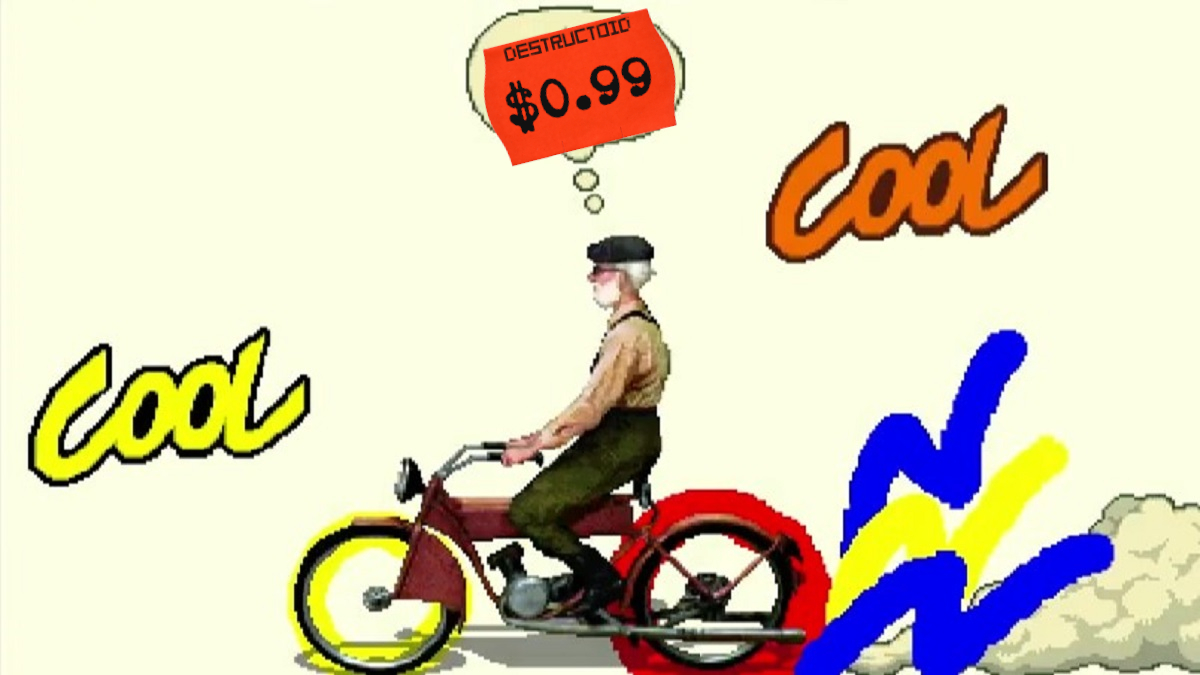On paper, 1995’s Cool Riders sounds great. It was the follow-up to 1993’s Outrunners, which itself was a multiplayer follow-up to 1986’s Out Run. Only this time, it’s on motorized bikes. Then you see it, and you realize Cool Riders is one of the least cool games to exist.
Let me back up a sec here. Cool Riders is absolutely one of the best retro games I’ve been introduced to this year. It’s a year where I feel something finally snapped in my head, and I’ve come to legitimately enjoy a lot of kusoge. But the thing about Cool Riders is that it certainly looks like kusoge, but it doesn’t play like it.
It’s sort of a Street Fighter: The Movie: The Game situation. While the game’s graphics give you that whiff of kusoge, the mere fact that it’s built on the bones of a better game means that it’s still enjoyable. Better than enjoyable, actually, Cool Riders is a riot.
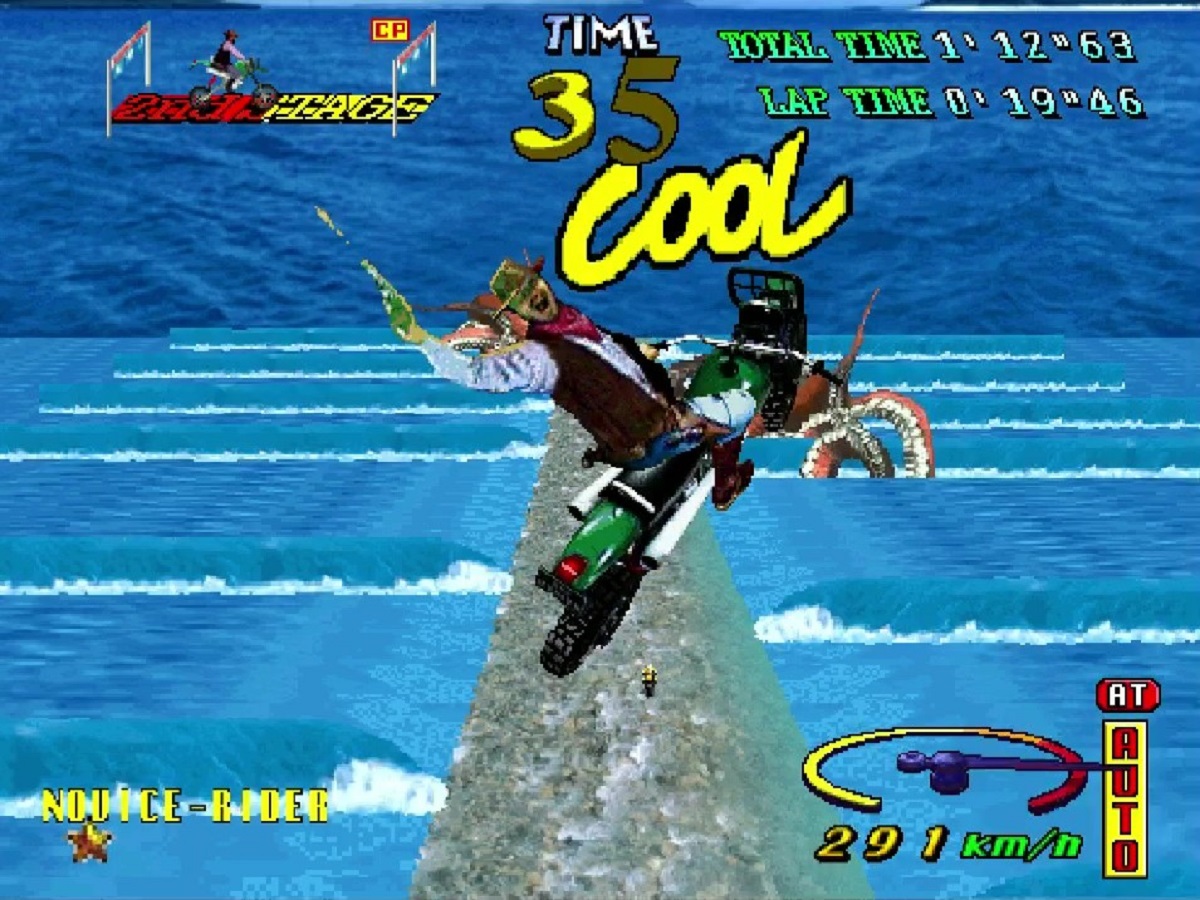
The fat is in the fire
By 1995, following some tentative hesitation, Sega was well into its conversion to 3D arcade games. Cool Riders is a bit of a strange latecomer. It was one of the last games to use Sega’s Super Scaler effect, pairing it with your typical raster effect to create 3D visuals. To put this into perspective, that year would have it competing against Sega Rally Championship for floor space. It was also the only game to be produced on the Sega H1 Board, which meant that the MAME community had quite a struggle getting it emulated properly.
The strangest part of Cool Riders, however, is the game itself. I’d love to see what the development pitch was like. It looks like something that was thrown together, but when you really dig into it, you realize that the whole thing was deliberate. A whole bunch of digitized actors and photo manipulation to create something that looks like an unholy union of Katamari Damacy and early ‘00s animutation.
It’s a bizarre maelstrom of ideas, with drivers that include a lady on a Vespa, a cowboy, and a devoted father. It’s obvious that the developers at Sega AM1 weren’t taking this very seriously, but how such a mish-mash of ideas came together, I’d like to know.
Seriously, I would like to know what the development of Cool Riders was like. There’s precious little behind-the-scenes information I could find. Not that it’s usually easy to find background information on ‘80s and ‘90s arcade games unless they’ve made a massive impact, but I’ve never been this curious before.
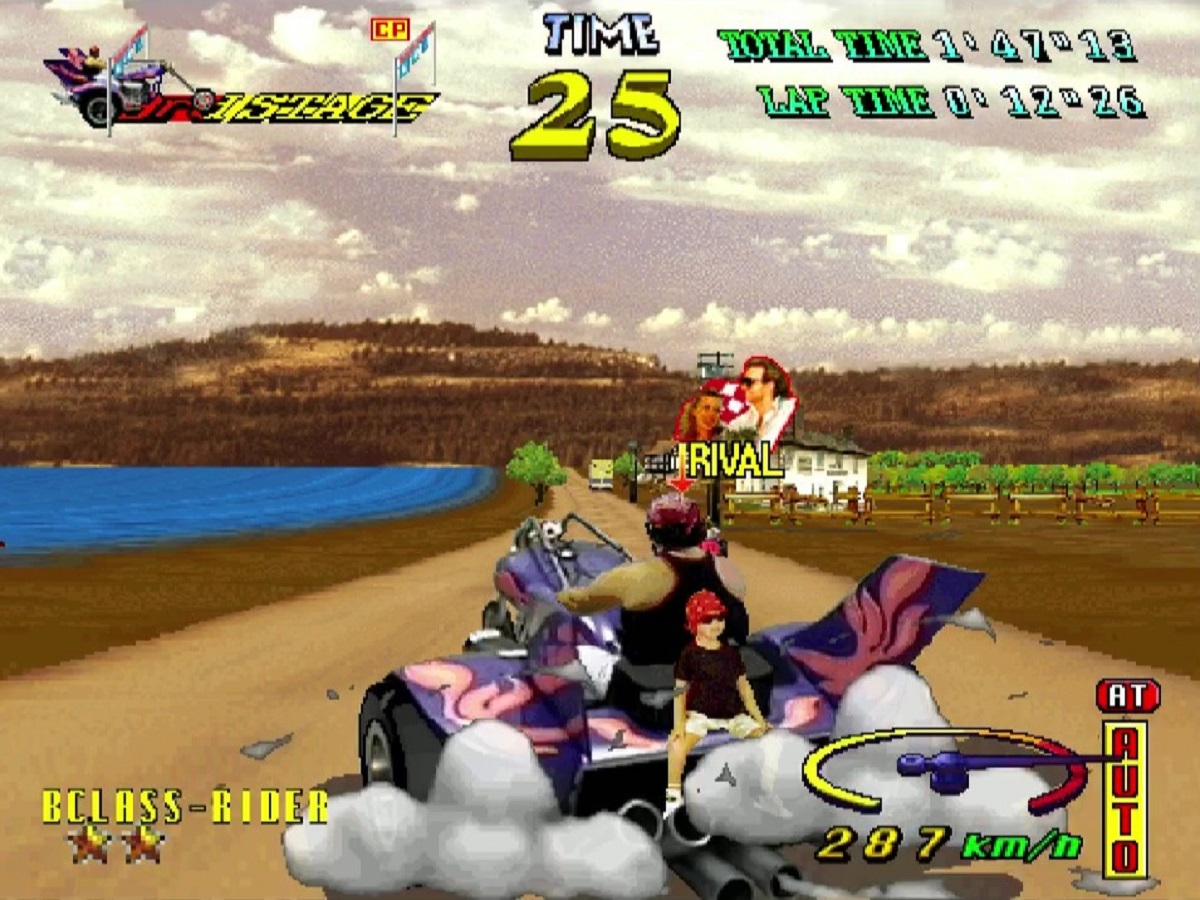
Grandpa Is Still Alive
What separates Cool Riders from Outrunners and, well, most games at the time is its use of digitized photography. That wasn’t entirely rare at the time, with Mortal Kombat famously utilizing this approach. But games like that and Pit-Fighter were earnestly trying to look good. Futuristic, even. The art in Cool Riders obviously isn’t trying to achieve that. It fully embraces its ridiculousness.
People who have worked with porting the game have said that it uses a lot of assets from Outrunner, but I would never believe that the two were related. It’s hard to really describe the visual style.
It’s like if walkedoutneimans decided to travel back in time and get a job at Sega. It’s like someone dropped a travel magazine in a blender and hit Frappe. It’s like a Bible game that gave up on Jesus partway through development.
The game’s premise is essentially the same as the Out Run games. You’re given a time limit to reach the checkpoint on a continuously splitting sprint. This time, however, you have the option of traveling West or East across the world or just keep your journey in the Americas. However, the world is depicted through the eyes of someone on psychedelics who never left their apartment.
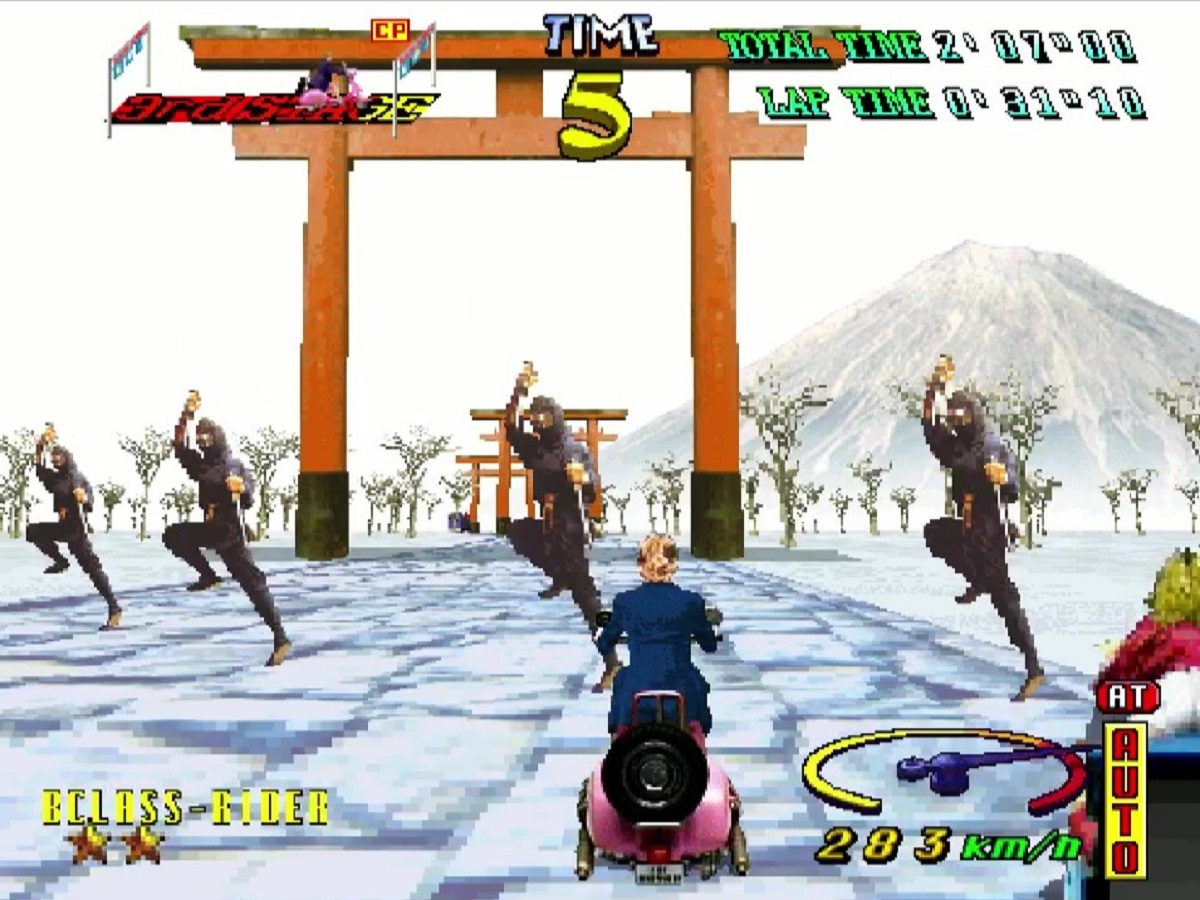
Here Come Queen of Hurricanes
Even Japan, the country this game originated from, is depicted with sprinting ninjas and old castles. One of my favorite courses is the East Indies, where you travel across the ocean floor while flanked by sharks and giant octopi. You zoom through these stages at a blisteringly fast speed near the edge of control. Part of the challenge is just being able to read the obstacles that are constantly streaming by the edge of the road.
The drivers are incredible. A backstory for each of them is hinted at, and they’re given a lot of fanfare for characters we have never met before. There’s the aforementioned woman on a Vespa who is aided by official-looking dudes in suits. There’s a Frankenstein’s monster of a robot and an old man riding a souped-up, old-fashioned moped. One that I mentioned is this biker-looking dude who rides on a tricycle with his two children. Who are these people?
The game opens with Born to Be Wild by Steppenwolf, which sounds like it fits more with a Harley Davidson stuffed in the corner of a movie theatre. Then you get into the game, and each of the characters has their own theme, and they frequently feel completely divorced from what is happening on-screen while also being kind of good.
The cabinets usually came in a pair, allowing you to race against a friend or unwelcome stranger. It doesn’t really affect much in gameplay, as the timer is your primary adversary, but whoever wins in any leg of the race gets to choose which branch is taken next. It’s a nice but unnecessary addition.
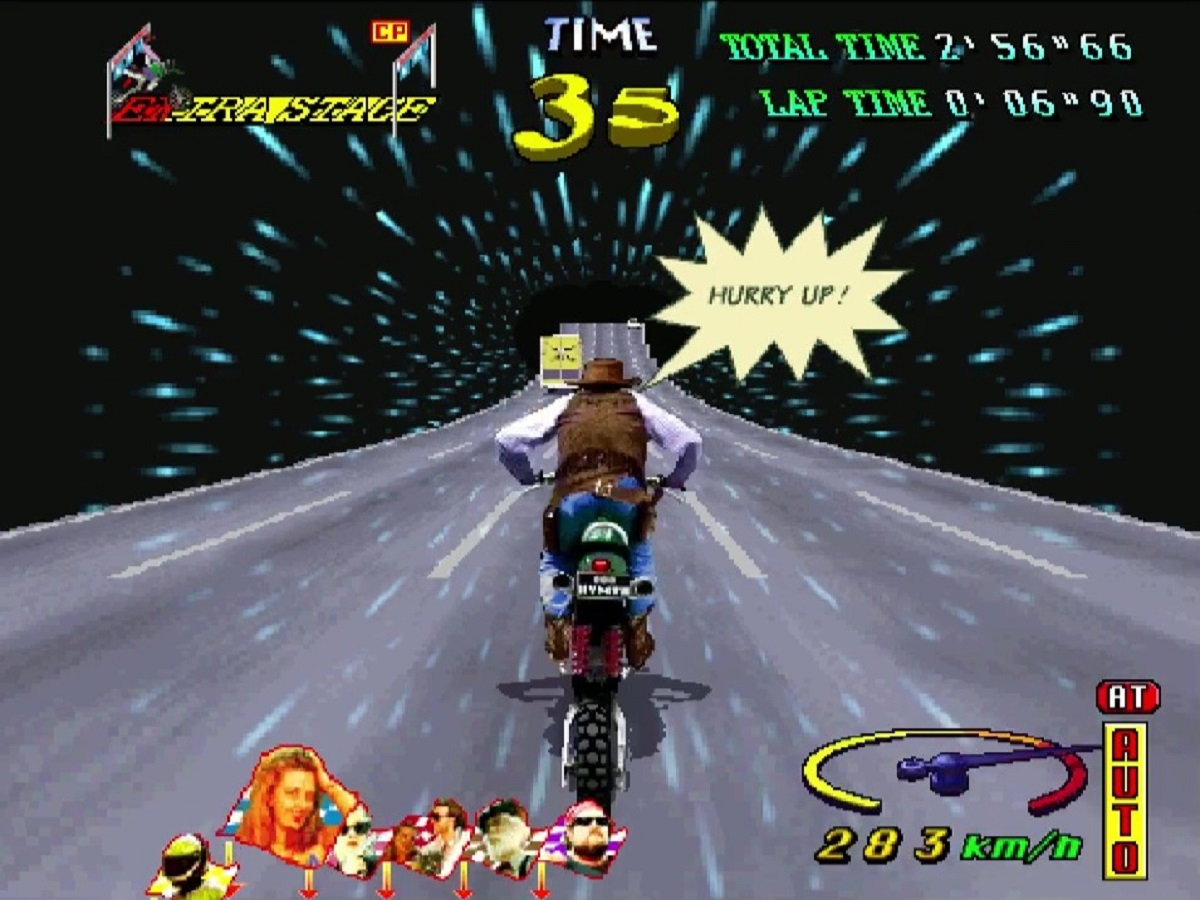
A Little Good
I’m not sure I can really express how much fun Cool Riders is. I got into it mostly because I love exploring Sega’s Super Scaler games, but I quickly found myself hooked. I played it over and over, trying to reach the game’s absurd finale. I’m no doubt going to pick it up again after this.
It’s an absolute sugar rush of a game, with bizarre, eye-catching scenery flying by. Endless basketball players in Chicago, Dracula in Romania, Mount Rushmore in the Rockies for some reason. It’s incredible it begs you to try and explore all the tracks, to test out every driver, to dive further and further into the mind of a broken genius. It helps that it was built on the bones of Outrunners and is made better because it is absolutely in on the joke.
The fact that Cool Riders has never been ported is a travesty. Nothing on the Sega Saturn, not even a nod anywhere else. It feels like Sega doesn’t even know it exists, buried deep down in its back catalog. For that matter, Outrunners hasn’t been ported outside of an absolutely abysmal Genesis/Mega Drive version.
I don’t have much hope for it getting ported now, especially given how much trouble it gave MAME developers, but I’m going to make it my mission. At every possible opportunity, I’m going to bring up Cool Riders. I’m going to talk about it until everyone knows about it. Whenever I’m face-to-face with a Sega rep, I’m going to bring it up, searching for that spark of recognition or watching them squirm as they try to figure out what I’m talking about.
Cool Riders must ride again.
